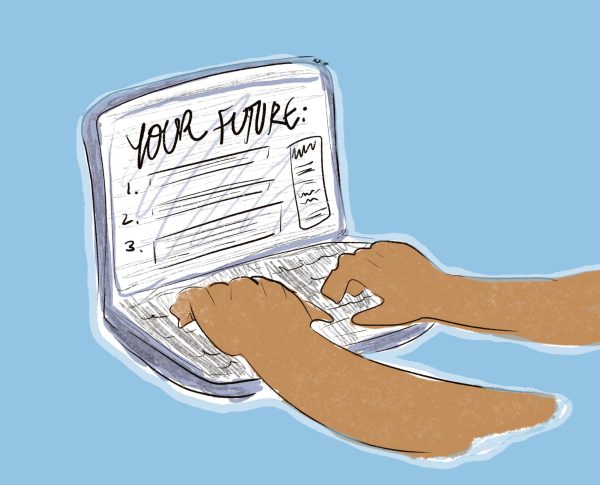The f-word
Weight discrimination is the fourth most prevalent form of weight discrimination. For example: 93 percent of employers would choose an applicant of “average weight” over an equally qualified fat applicant.
When most people use the term fat, they use it with the intent of depreciation: associating the word with being lazy, unattractive, miserable and not the “desired” weight.
Ellery Rosenzweig, a University of Michigan graduate, remembers when someone called her fat for the first time: she was 16 and babysitting her little cousin. Out of the blue, her cousin looked at her and said something no teenage girl would’ve wanted to hear: “you’re fat.” She was insulted; she thought it was hurtful and rude, but later she realized that only because that’s the meaning our culture has affiliated ‘fat’ with.
‘Fat’ doesn’t have to be an awful word; it’s just another descriptive term — a characteristic that should carry no shame.
However, this doesn’t mean we should start calling everyone fat. There are people who choose to identify as fat and recognize it as an empowering thing, but there are still those who don’t like to identify as fat because the word still holds so much negative energy.
“[Being fat] is so ingrained to be a fear, like oh my god, people would rather not be fat than so many things because [you’re perceived as] unwanted, not sexual, not beautiful, and a joke,” Rosenzweig said. “It’s so sad, but it’s true.”
Some like to identify as plus size, or overweight, but all these terms do is imply that there is only one “average” weight or size we should be achieving, and anything other than that is “abnormal”.
Just like how many other communities have taken back some of their own terms once used to belittle them, the fat community wants to take back ‘fat’ and turn its meaning into a positive one.
So why is having a larger body type associated with so many negative connotations?
This toxic idea started with medical professionals connecting fatness with health problems, causing false information to spread around —- infecting western culture. From these claims emerged a monster profiting about 70 billion dollars annually: the weight loss industry.
“I can remember dieting since I was nine years old,” Rosenzweig said. “My parents took me to a nutritionist because they were so worried about me being chubby. They’re like ‘oh, this will help her’ but there was nothing wrong with me. I was just nine and eating chicken fingers. So from the beginning, [it felt like] something was actually wrong with me.”
The truth is, your size has nothing to do with your health.
The idea that being “overweight” is harming yourself and others is a skeem created by the medical community and insurance companies to make an enormous profit by exploiting a group of innocent people. They found a public enemy: fatness, knowing the American public would treat it as one. Soon weight loss programs and trendy diets hit the market, using shame as their number one motivator.
Rosenzweig remembers being on Weight Watchers and Jenny Craig diets throughout her childhood.
“I would get to a certain [weight] I could never lose lower than, and once I’d get it off, I’d gain the weight right back,” she said. “It was this horrible cycle of never feeling good. Even if you do lose the weight, that means you have to change your lifestyle forever, and that is just really not realistic for everyone.”
Our trusted doctors and idolized celebrities announced to the world that being fat is wrong- a problem that needs to be solved. These credible sources sparked an evil idea in the public’s mind: fat equals bad.
Weight discrimination is a real and taboo treatment that puts fat people at a lower status than “average” weighted people. Other than the biting stares, unwanted health advice and long-term bullying, fat people are at a disadvantage in this world because of how they are perceived.
While fat people are mischaracterized as unhealthy by medical professionals and would appear to receive more treatment and attention from that belief, the actuality is that when fat people see a doctor for a medical problem, their weight becomes the originator of that problem. In a survey of 1,449 fat people, it was found that more than two out of three people were stigmatized by doctors. Because of this stigmatization, fat people are at risk for untreated problems, resulting in future health issues.
Another place we can see weight discrimination is in the workplace. Fat people get fewer hirings, promotions, are sometimes terminated—despite good job performance— and make 1.50 dollars per hour less than “average” weighted people. Only the state of Michigan and six other cities in the U.S have laws protecting individuals against weight discrimination. Having such a lack of protection for fat people in the workplace makes it extremely hard for those who are fat to have access to a stable and appropriate income.
The effects of weight discrimination and stigma surrounding fat people causes too much adversity to be ignored and kept quiet.
Some might say this movement is skinny-shaming, but that couldn’t be further from the truth, in fact, it’s about accepting and loving all bodies. The voices behind the movement aren’t saying skinny people aren’t subject to being made fun of or being stigmatized, it’s about addressing the fact that fat people face daily challenges and extra setbacks because of the inaccurate assumptions about their body or size.
“Everyone deals with like body image issues, that’s just a conditioned thing, but when you’re in a body where you’re not told to manipulate it and change it, there’s a different weight of discrimination that comes with your size,” Rosenzweig said. “People just want to highlight other bodies. They want to see people who look like everyone out there, not just one type of image.”
We need to start recognizing ways in which we contribute to body biases and weight discrimination, as well as checking our weight privilege.
Weight discrimination—like many other unjust treatments in our society—might never disappear for good. People will always have some type of weight bias and fear of fatness, unless we act now and start to change the ways our society perceives fat people.
A good place to start would be when we first learn about words and their meanings: teaching children that ‘fat’ is a characteristic, not an insult. We all picked up on ‘fat’s negative meanings from culture and through messages in our environment, so it’s no wonder why we all continued to believe in what we had observed. This means that what we see in the media, what they teach in schools, and what they tell you at the doctors’ has to change.
In addition, there needs to be more representation of the fat community in magazines, starring in lead roles, walking down runways (not just runways dedicated to “plus-size” models), holding positions of political power, sitting at reception- front and center, and leading a company as a CEO.
“I remember watching The Disney Channel and none of the girls looked like me, but they had like the cutest styles, and I would try to wear the clothes they wore and I never looked like them,” Rosenzweig said. “I never was as thin and there wasn’t any representation [like me]. I mean of course there were white girls [with] brown hair that looked like me, but no one of my size.”
The more we see impowered fat people throughout every level of our society, the more weight discrimination will fiddle away.
“There’s so much to learn and unpack about fatness in our culture, from gym class, to going to your doctor, to buying clothes, it’s ingrained in everything,” Rosenzweig said.
We, as a society filled with so many different backgrounds, beliefs, personalities, and sizes, have to understand that no one should be attacked with shame or judged based on inaccurate ideas about their health or identity. It’s time to open our minds and change the way we view fatness.

Leah Dame is currently a senior and is in her third year working with the Communicator. When she isn't writing articles, you can find her watching Pokemon, listening to music in her car, or finishing up some last minute history homework. She is excited to meet new and exciting people through journalism this year as well as hearing their stories.









